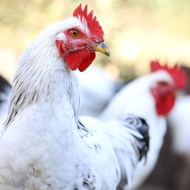Avian flu confirmed at Hampshire farm

Avian flu has been confirmed at a commercial chicken breeding farm in Hampshire.
A low severity case of avian flu has been confirmed in chickens at a farm in Hampshire, Defra have announced.
Tests have confirmed the outbreak as the H7 strain of the disease, a much less severe form than the H5N8 strain which was found at a Yorkshire duck farm in November. Defra say that there are no links between the two cases.
Robust action is already underway to try and prevent the spread of the disease. A 1km restriction zone has been imposed around the commercial chicken breeding farm and the birds are set to be culled.
Public Health England say that the risk to public health is very low, and the Food Standards Agency say that there is no food safety risk for consumers.
Chief Vet Nigel Gibbens commented: "We have taken immediate action to contain this outbreak as part of our robust procedures for dealing swiftly with avian flu. This is a low severity form of the virus and we are taking action to ensure that the disease does not spread or develop into a more severe form.
"We are investigating the possible sources of the outbreak. I would urge poultry keepers in the surrounding area to be vigilant for any signs of disease and to ensure they are maintaining good biosecurity on their premises."
A spokesperson for the Food Standards Agency said: "On the basis of current scientific evidence, Food Standards Agency advice is that avian (bird) flu does not pose a food safety risk for UK consumers. Laboratory investigations on the outbreak indicate that it is the N7 sub-type of H7 but this will need to be confirmed in further testing."
Defra urge anyone suspecting avian influenza to immediately contact their nearest Animal and Plant and Health Agency (APHA) office.



 The latest
The latest